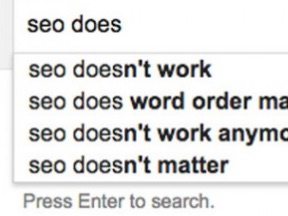Search engine optimization isn’t a mystical dark art. It boils down to signals of relevance and authority. Understanding the signals that search engines interpret as relevance and authority is key to understanding SEO.
Millions of pages across the web fight for visibility every time a shopper searches Google and the other search engines. Only 10 are chosen for the first page of search results, and sometimes as few as seven. How do the search engines determine which of the millions of web pages to rank on page one, and which is ranked in the coveted first position?
Search engines have developed their own series of algorithms, which are complex instructions that make up each search engine’s software. Those algorithms use hundreds of signals to determine which web pages will rank, but most of them focus on relevance or authority in some way.
SEO Relevance
Relevance speaks to how similar a web page is to the query a shopper has entered into the search bar. Relevance is fairly simple to understand because it is connected to keywords — a shopper searches for a keyword and when you use that keyword optimally in a web page it ranks better.
For example, if a searcher wants to find the best smartphone, she might search Google for the phrase “best smartphone.” Google’s algorithms in this instance would seek out content that is relevant to smartphones that are considered to be the best.
Relevance is fairly simple to understand because it is connected to keywords…
It’s important to note, however, that Google is not making a judgment call on which phones are actually the best. Rather, Google is trawling its index to determine the content it has indexed that speaks to “best smartphone.” The same is true for the other search engines.
In their search for relevance, search engines also look for synonyms. For example, they would group cell phones, cellular phones, and mobile phones into the same group of devices. Cordless phones, on the other hand, would not be synonymous because they require a land-based phone line, not a cellular network.
Since not all mobile phones are smartphones, they would not be synonyms but, rather, close matches. These words would still be relevant to each other contextually because smartphones are the most common type of cellular phones in the U.S.
Search engines also look for contextual relevance with increasing frequency. Contextual relevance is based on concepts as opposed to direct use of keywords. It analyzes the types of words, phrases, and topics that are found when web pages speak about a keyword. For example, when web pages discuss which smartphones are the best, they often also mention brands of phones, cellular networks that the phone runs on, amount of memory, camera pixels, and screen size.
SEO Authority
Authority is trickier to grasp because it taps into the structure of the web and how that structure identifies some pages and sites as more valuable than others.
Think of the web as a series of pages and links — a kind of map if you were to view the whole thing at once. Web pages are the destinations, the place where content lives that searchers want to find. Links are the connectors, the pathways for search engines to find that content so they can serve it up to searchers. Search engines can only find web pages if there is at least one link — one pathway — to it.
Authority is trickier to grasp because it taps into the structure of the web and how that structure identifies some pages and sites as more valuable than others.
Now think of that map as a roadmap of a country. Each link is like a road and each web page is like a town or city. Larger cities are more likely to have many roads leading to them.
Similarly, more authoritative web pages will have more links and more important sites pointing to them. Each link conveys a form of authority, a vote of confidence that the page being linked to is indeed relevant and important enough to send people to. That authority is one of the most valuable commodities in SEO. It contributes strongly to the ability to rank.
In addition to the authority that individual web pages collect, the domain of a site will also collect authority. Each page on the site contributes its authority to the larger pool that the web site collects to signal to search engines that the entire site is authoritative.
The idea of domain authority is best understood using the analogy of juice. Link authority, the authority collected in a web page by virtue of the many links pointing into it, is like a tall glass of refreshing juice. This link juice lives in every page of the site and keeps the site’s search engine performance alive. Each page has some amount of link juice associated with it, which contributes to the amount of juice that the site has as a whole.
The juicier a web page and a site is, the more likely it is to rank well and attract more shoppers via organic search. Conversely, deleting pages or changing URLs drains a site’s juice, weakening its ability to rank if not done optimally for SEO with a redirect strategy to preserve its juice.
Authority can also reside in an author, though that’s less common in ecommerce. Human authority is based on the connection of authoritative articles hosted on authoritative pages attached to an authoritative name. In the business world, these would most likely be research or scholarly articles in industry publications.





